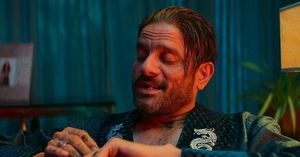A tragic fraternity hazing incident at the University of Missouri has left 19-year-old Daniel Santulli with severe brain damage, unable to walk, talk, or see. The event has sparked renewed discussions on the dangers of hazing practices within college Greek life.
Daniel, who joined Phi Gamma Delta fraternity, was forced to drink an entire bottle of vodka during a pledge event on October 19, 2021. His blood alcohol level was recorded at over six times the legal limit when he was discovered unconscious.
This incident is providing the focal point for A&E's upcoming docuseries titled "Houses of Horror: Secrets of College Greek Life." The series features heart-wrenching testimonials from Daniel's family, friends, and experts, reflecting on the unhealthy culture of fraternities.
Mary Pat Santulli, Daniel's mother, expressed how sleep deprivation and financial pressures from the fraternity impacted her son leading up to the incident. She had urged him to reconsider his decision to pledge, fearing the toll it was taking on his wellbeing.
Daniel had faced dangerous situations before this hazing event, including being told to climb inside a trash can filled with broken glass just days earlier. That prior incident had already raised alarms about the fraternity's treatment of its pledges.
Security footage from the night of the incident reveals alarming details. It shows Daniel losing his balance and struggling to stay upright before collapsing multiple times, with fraternity members carrying him and leaving him to fall on the floor.
After Daniel remained unresponsive for some time, he was taken to the hospital, where doctors later confirmed he had suffered significant brain injuries due to alcohol poisoning. The horrendous consequences of this hazing ritual have now made Daniel dependent on constant care.
His father, Tom Santulli, shared the painful decision to watch the traumatic footage of the event. Despite its difficulty, he felt compelled to see what happened and emphasized the importance of accountability for those involved.
The emotional weight of the incident has been heavy for the Santulli family, who now serve as Daniel's primary caregivers. They receive additional support from nursing staff and specialists to help with his rehabilitation.
Since the incident, three fraternity members—Ryan P. Delanty, Thomas Shultz, and Alec Wetzler—have pleaded guilty to charges stemming from their involvement. Their admissions signal possible repercussions for such activities within Greek organizations.
Daniel is now regarded as one of the most severe hazing victims in U.S. history, with his family advocating for awareness and reform. They desire systemic changes within colleges to restrict such dangerous practices from happening again.
Mary Pat warns other parents about the risks associated with fraternity involvement. She urges them to research the history of organizations and recognize the potential dangers posed by peer pressure.
Daniel's story serves as both a cautionary tale and rallying cry for reform against hazing. It challenges the glorification of fraternity culture and highlights the need for protective measures for students.
The Santulli family's experience echoes the collective grief and urgency shared by many affected by hazing. They continue to push for advocacy work, hoping to prevent future incidents and to honor Daniel's struggle.
With episodes of "Houses of Horror" airing weekly, their story seeks to enlighten the public on the adversities faced by students under the shadow of Greek life. The aim is not just to share their pain, but to illuminate the pressing need for change.
Daniel’s case exemplifies the harsh reality of hazing and the human cost it can incur. Amidst the fight for justice, his family remains steadfast, believing he survived for a reason to help others recognize the severity of this growing issue.



